
7 Findings That Matter Most In Your Local, Off-Page SEO Audit [with Examples!]
Posted Mar 27, 2024 | Updated 2 years ago
It’s no secret that people frequently turn to the Internet to get ideas and search options for local businesses when they’re in need of a particular service or product.
The goal is to make sure you’re as high on the list as possible in their search-engine results. This is particularly important when it comes to individuals who will make the most valuable and probable customers: those living in the Colorado Springs area.
Sure, there are some things that people will shop for online. But for many service providers and retailers—from landscapers and construction companies to nonprofits and healthcare organizations—customers would rather stick closer to home.
You can assess the health of your professional website and how it’s faring against competitors in terms of search-engine optimization (SEO) by running an audit and analyzing the results.
On-page vs. Off-page SEO: What’s the Difference?
There are two main categories of SEO: on-page (technical) and off-page (local) SEO. Both are equally important contributors to the health, visibility and ranking of your website; the user experience; and how effectively it’s connecting with your target audience, or those who are in need of what you offer or supportive of your nonprofit cause. There are mutually beneficial aspects of technical and local SEO, and both should be a priority for any business in Colorado Springs.
Technical SEO, as the name implies, has to do with the technical aspects of your website, including site speed, structure, security, and responsiveness across different devices, primarily impacted by how your website is built and where your site is hosted. If you choose the right website developer, they will finesse the technical elements of your site to ensure search engines have an easier time crawling and indexing your website.
The easiest way to think about off-page, or local, seo is to think of the various distribution channels a searcher may use to wind up getting to your website. There are more external players involved and isn’t quite as easy to control. Off-page, or local, seo revolves around integrating strategies that will help provide opportunities for your website to become visible in other places online, beyond your main domain. Some key tools to improve your off-page SEO include optimizing your Google Business Profile, investing in digital PR and backlink building, and getting listed in directories, to name a few.
A straightforward way to understand how your website is doing in terms of local, off-page SEO is by working with your website developer or another digital marketing professional on a local seo audit. This will provide you with important data regarding your website’s SEO and performance that you can use to take steps toward improvement.
What Should I Look for in a Local, Off-page SEO Audit?
Numerous factors affect your website’s off-page SEO, and a good SEO audit will analyze a well-rounded selection of factors. From there, you can prioritize which aspects of your search engine visibility need the most attention or work to help you improve your website and get the results you desire.
Here are two examples of what we report on when we run local search audits for small businesses targeting local customers:
Example A:
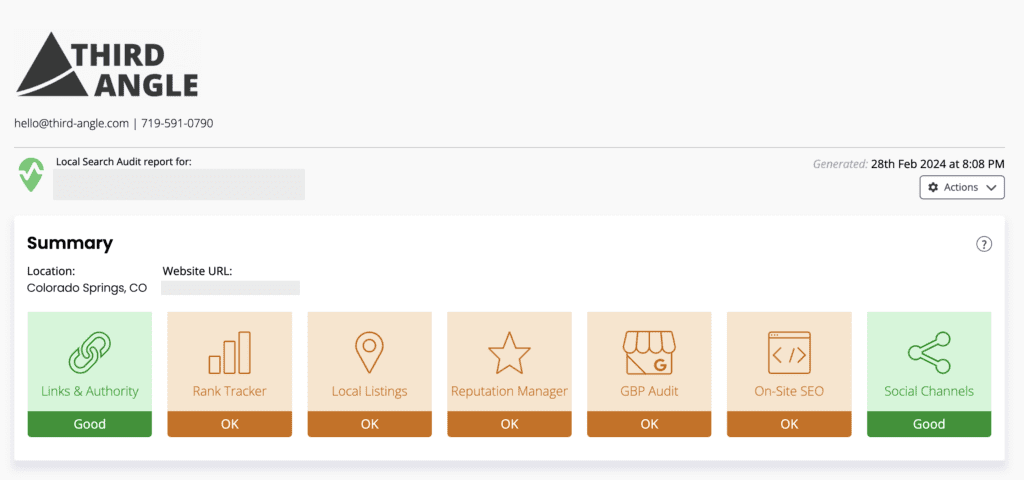
Example B:
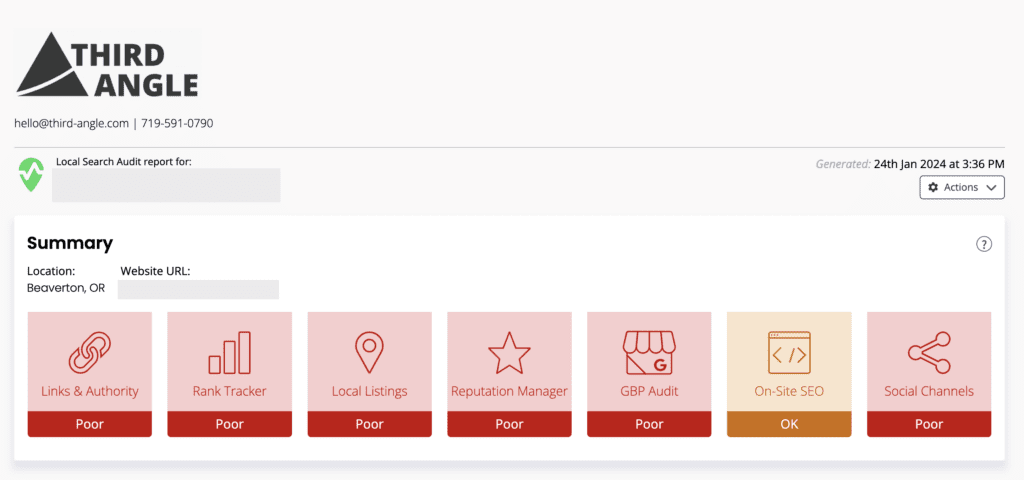
Let’s unpack each of these important local SEO ranking factors:
1. Links and Website Authority
One factor a good local SEO audit should analyze is key SEO indicators, such as your domain authority, link count, linking domains, citation flow (cf), and Google Index count. These metrics play a big part in how high your business ranks in search engine results and how it ranks in terms of Google’s E-E-A-T standards (Experience, Expertise, Authoritativeness, and Trustworthiness). SEO companies, such as Third Angle, may generate some of this data through their own proprietary systems, while other data is pulled from trusted partners.
Example A:
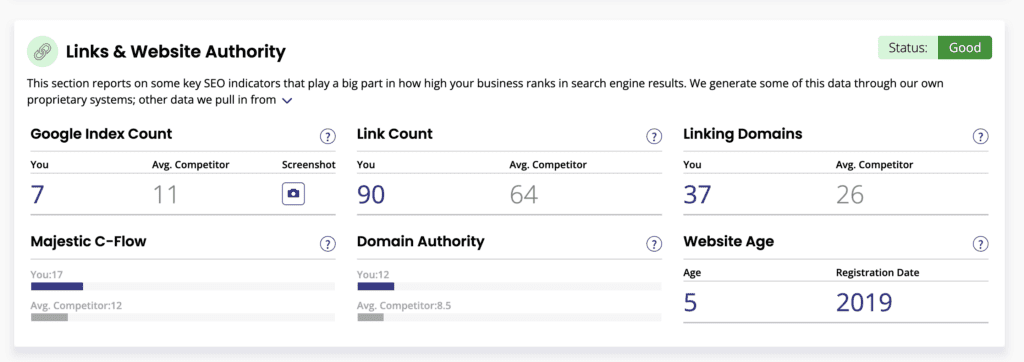
Example B:
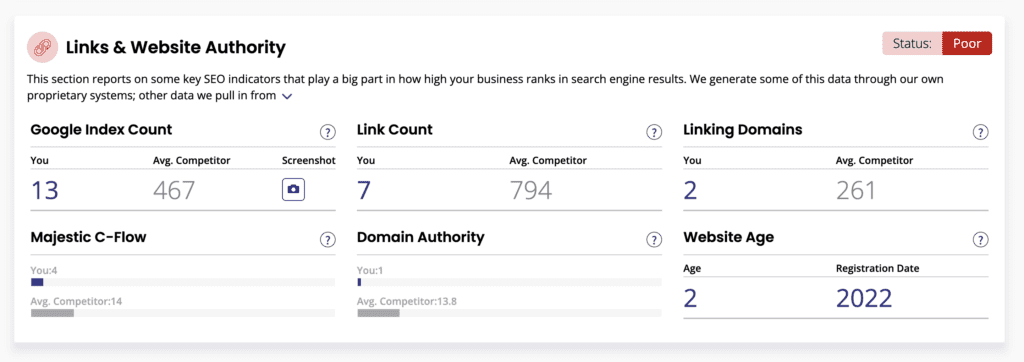
2. Rank Tracker
Another section of your audit should give you information on how your business website ranks for relevant and important keywords and keyword phases. In other words, what is its average position on search-engine results from Google platforms (including Google Desktop, Google Mobile, and Google Maps) and Bing?
For a landscaping or gardening company, some important keyword phrases might be “landscapers in Colorado Springs,” or for a healthcare practice, they might include, “healthcare providers near me” or “hospitals in Colorado Springs.”
Example A:
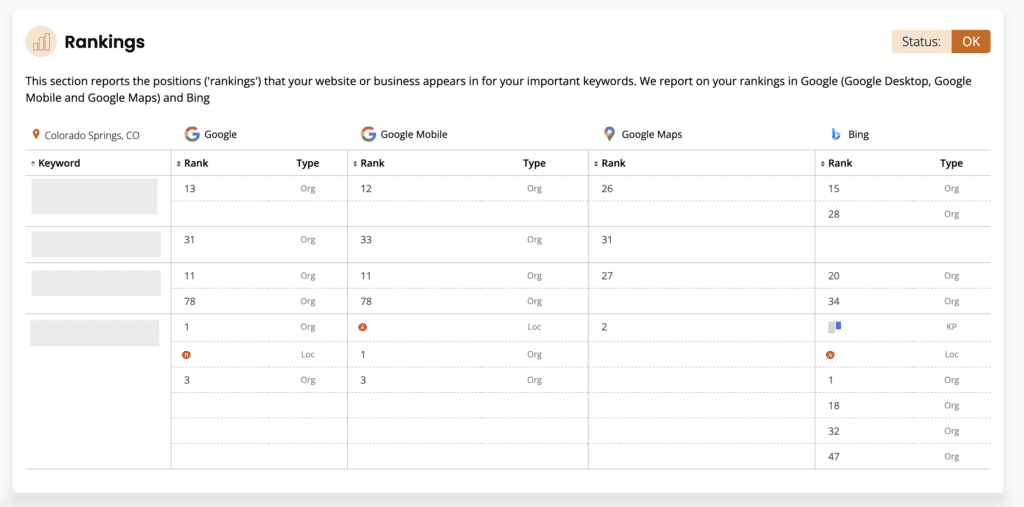
Example B:
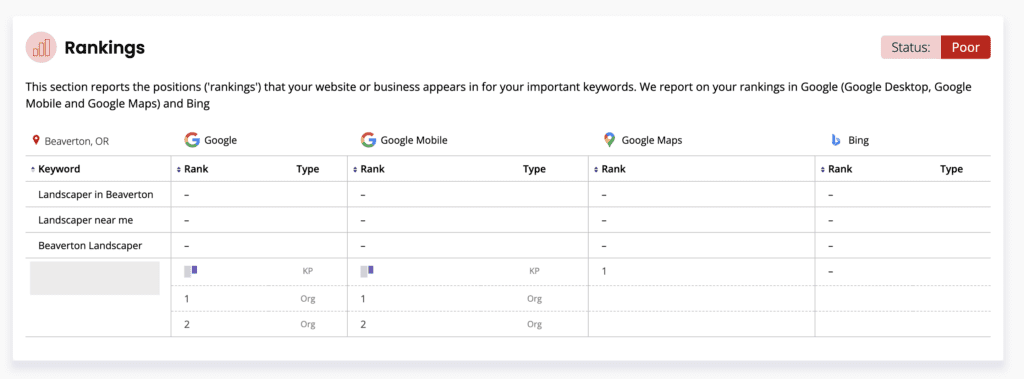
3. Local Business Listings
For local businesses, it’s critical your address and contact information is correct and consistent across the web, otherwise you risk losing potential customers who can’t find or become confused about what information is accurate. Additionally, it provides reliable information to Google about your business.
A good off-page SEO audit will review your NAP (name, address, phone number) across the most powerful online data aggregators and directories and then provide information on whether you have a listing on those sites; ensure the information is complete; and flag errors or inconsistencies that need fixing. Some popular sites and directories include BBB.org; Citysearch; Cylex; Facebook; Foursquare; InsiderPages; Local.com; MapQuest; Yahoo! Local; Yellow Pages; Yelp; and Superpages.
Example A:

Example B:

4. Reputation Management
Your online reputation is another important part of having strong local SEO. People rely on reviews and ratings to sift through local companies. To help with that SEO strategy, your audit will look at the reviews you’ve received on popular review sites, as well as your average rating and score. Some of the most important review sites include Google; Facebook; Yelp; Foursquare; and Yellowpages. This will give you a chance to see what people are saying about you (good and bad), respond professionally and effectively, and make any necessary adjustments to improve your reputation.
Example A:
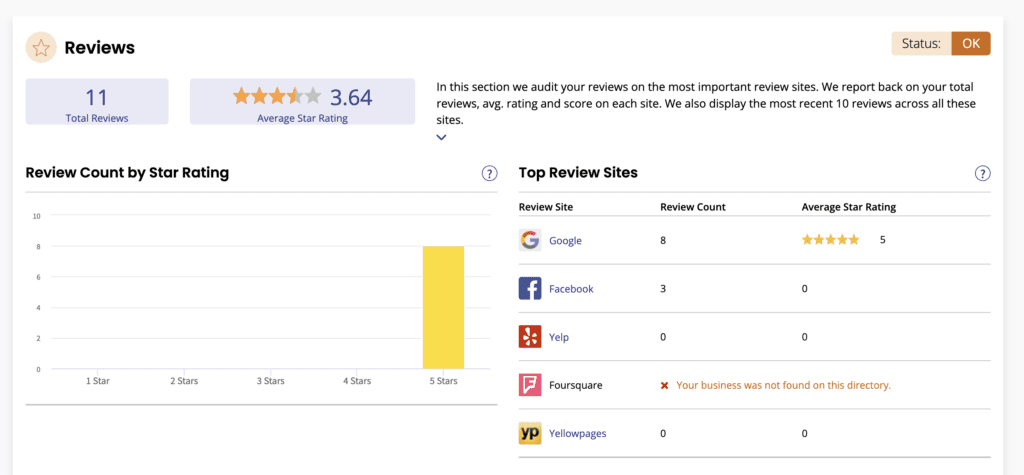
Example B:
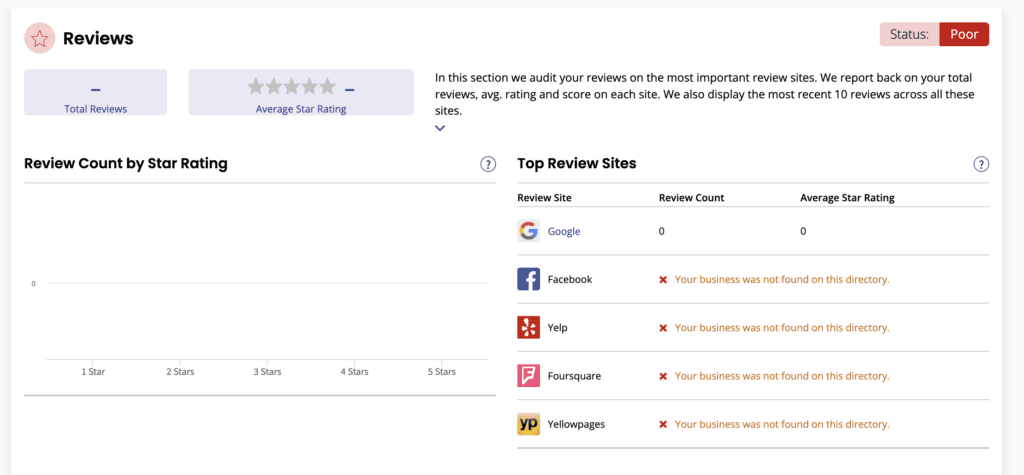
5. Google Business Profile Audit
Another section of your SEO audit should analyze your Google Business Profile (GBP) and report on a variety of integral criteria and benchmarks. Google is the No. 1 search engine and GBP is Google’s tool for ensuring local businesses, organizations, and places are listed, which makes it a powerful and cost-effective marketing opportunity.
Google Business Profiles appear in organic search results as well as Google maps results on both desktop and mobile devices. This part of your audit also will show you how your company compares to other businesses in your area who are in the same category, such as “landscaper” or “landscape designer,” “health and beauty shop,” “legal services,” “pet groomer,” etc. Google offers more than 4,000 business categories, and you can choose one primary category and up to nine additional categories.
Example A:
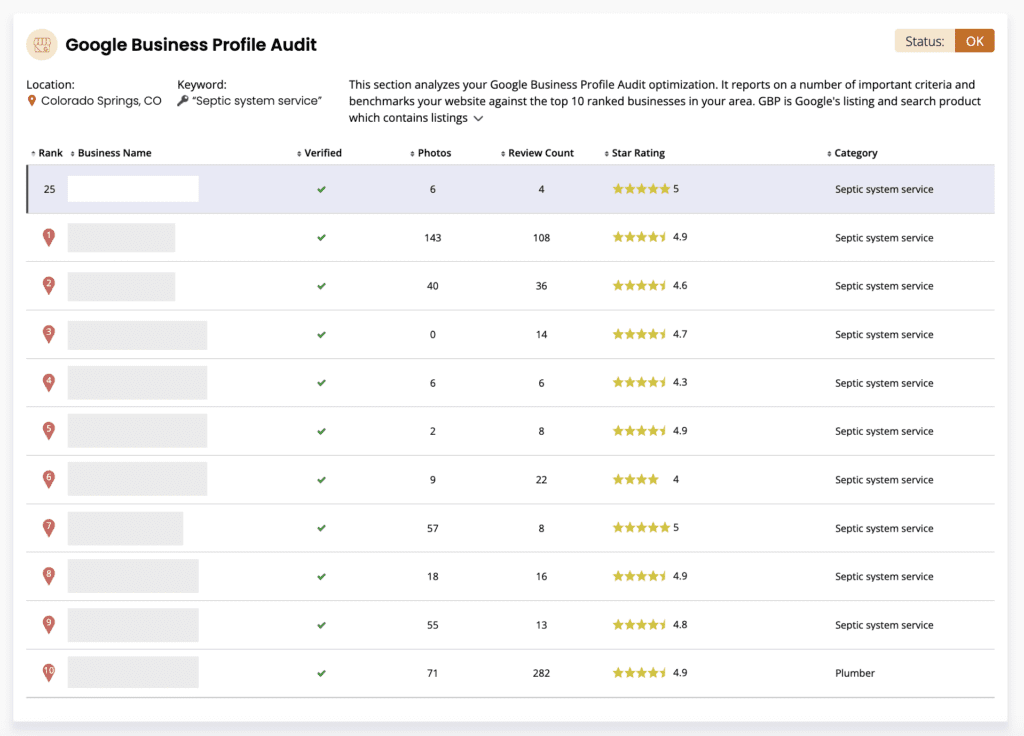
Example B:
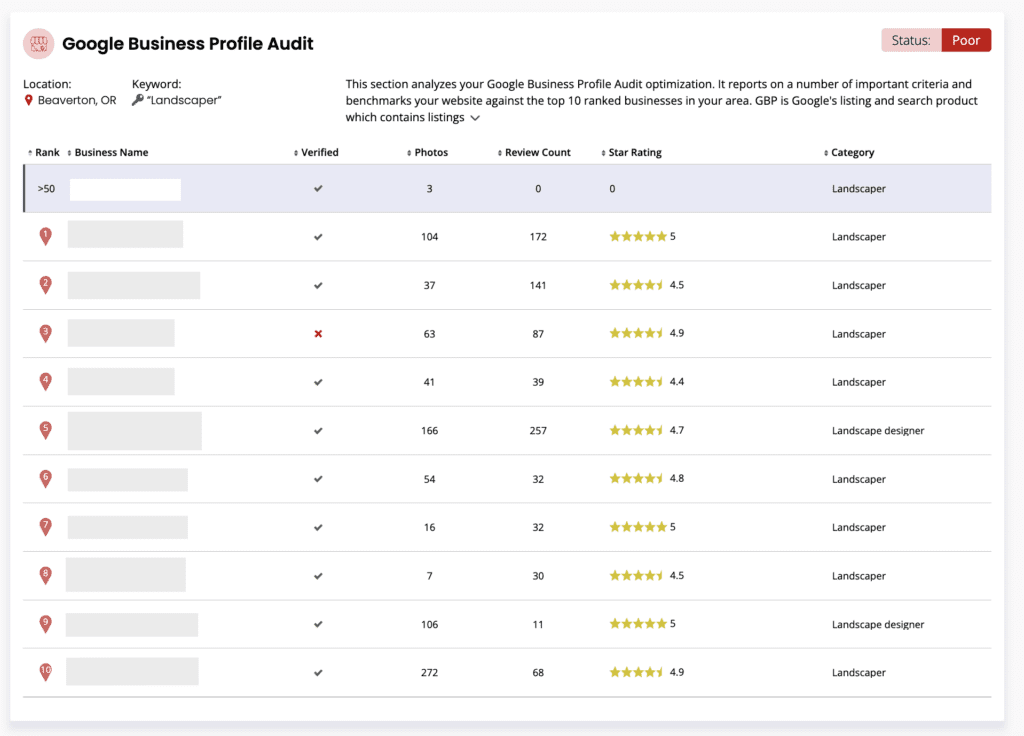
6. On-Site SEO
As mentioned before, all the different SEO elements work together to affect the performance, functionality, and usability of your professional website. That’s why you want to make sure your SEO service also takes into consideration on-site SEO factors that affect your ability to rank high in search engines. These are elements of your website—either visible on the page or in the code of your website, which you can’t necessarily see, but search engines can.
This includes a wide variety of elements, including page load speed, XML sitemap, internal links, page titles and descriptions, image alt tags, responsive design, mobile rendering, schema.org markup, top keywords, and analytics tags, all of which can be analyzed with the local search audit we will run for you.
7. Social Channels
Finally, your social media strategy should work in tandem with your other digital tools to drive existing and prospective customers to your website so they can continue their journey with your business. It’s important to “socialize” your business so customers and supporters can share their experiences and be part of the community surrounding your brand. Social media platforms are also helpful for increasing awareness about your business and accruing reviews. Our local seo audits also analyze how you’re performing on social media to inform marketing strategies to increase your company’s visibility.
Learn How to Rank Higher in Local Searches
Optimizing your professional website requires a number of tools and strategies, but until you know how you’re currently performing, it can be difficult to make worthwhile improvements. To assist you, Third Angle provides a free SEO audit, which analyzes more than 300 data points.
Our Local Search Audit Report provides a full breakdown of current search performance, showing data on backlinks, local listings health, reviews, on-site SEO, Google My Business, and even social channels. We prioritize items so you can get the most impact as quickly as possible, enabling your business to be found easier and rank higher across the web.

Let's Talk Marketing!
Simply give us a call at 719-591-0790 or reach out below:
Hi! I'm Sarah Perry, Owner of Third Angle. My team and I are here to help you with your website and digital marketing, as well as your print and mail marketing needs.
